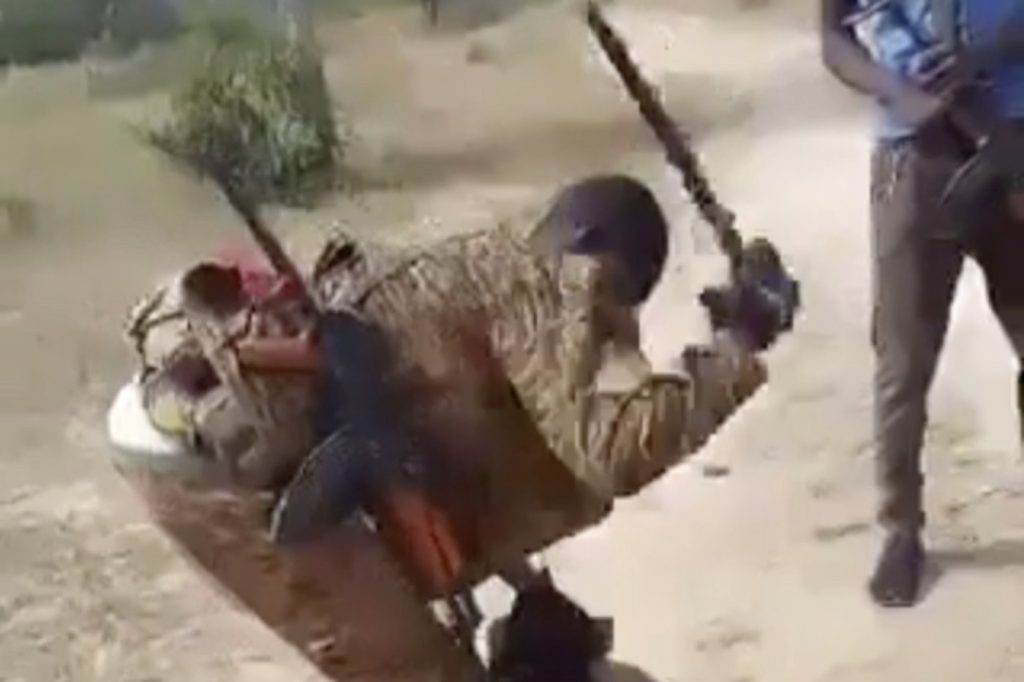DAKAR, Senegal (AP) – The International Criminal Court (ICC) has been urged to evaluate a confidential legal report that accuses the Russia-linked Wagner Group of committing war crimes by disseminating images of alleged atrocities in West Africa on social media, some of which purportedly depict cannibalism. The brief, exclusively accessed by The Associated Press, highlights videos showing armed men butchering corpses believed to be civilians, engaging in acts of violence including the removal of organs and boasting about their actions.
The violence in the Sahel region, an arid area south of the Sahara Desert, has reached unprecedented levels as military governments battle extremist groups associated with al-Qaida and the Islamic State. In a strategic pivot, Mali, Burkina Faso, and Niger have moved away from their traditional alliances with Western nations like the United States and France, opting instead to collaborate closely with Russia and its mercenaries. This shift is believed to have resulted in a surge of atrocities and dehumanization not witnessed in the region for decades.
Social media platforms now provide a disturbing glimpse into the violence occurring in remote areas with scant oversight from authorities or external monitors. While the authenticity of the images remains difficult to verify, experts argue they could serve as substantial evidence of war crimes. The ICC brief posits that the act of sharing these images online may also amount to a war crime, marking a unique legal assertion. Lindsay Freeman, director of the Technology, Law & Policy program at the Human Rights Center, UC Berkeley School of Law, noted that Wagner has adeptly utilized information technology to enhance its global brand of ruthlessness. Their channels on platforms like Telegram portray their brutal conduct across the Sahel, reflecting a public celebration of their violence.
The Rome Statute, which established the ICC, defines violations of personal dignity—particularly through humiliating treatment—as war crimes. Legal experts who submitted the brief contend that Wagner's alleged social media practices could amount to such violations. The details demand an investigation into Wagner personnel and respective governments for various alleged crimes, including extrajudicial killings and torture, committed in Mali from December 2021 to July 2024.
The ICC's Office of the Prosecutor indicated its current focus on alleged war crimes in Mali starting from January 2012, denying specific comments on the recent brief while acknowledging awareness of reports concerning significant human rights violations. Wagner, without responding to inquiries about the videos, continues to operate in the region as a principal player in the fight against extremism.
Despite the global focus shifting towards conflicts in Gaza, Ukraine, and Sudan, the Sahel has become the most lethal area for terrorism worldwide. Reports suggest that half of the nearly 8,000 terrorist victims in 2023 occurred there, as various nations have reduced or withdrawn military presence. Wagner's involvement with African nations is viewed through the lens of expanding military collaboration, with the U.S. labeling the group a “transnational criminal organization.”
Following the death of Wagner leader Yevgeny Prigozhin in a plane crash in 2023, Russia has been developing an alternative, the Africa Corps, to continue its military objectives in Africa. Wagner recently announced its withdrawal from Mali, claiming a successful mission, while the Africa Corps indicated its intent to remain. Currently, approximately 2,000 Russian mercenaries are reported to be involved in combat alongside Malian forces, though their affiliations with Wagner or the newly formed Africa Corps remain unclear.
The content shared on social media, often graphic in nature, tends to serve as propaganda for military victories while simultaneously contributing to a chilling atmosphere of terror and humiliation. Experts have observed that the dissemination of these graphic materials exacerbates dehumanization, disclosing a troubling trend within the Sahel.
Many posts from alleged Wagner-affiliated channels consist of violent imagery accompanied by derogatory language targeting various communities. Instances of cannibalism portrayed in these videos have drawn widespread outrage, with military authorities in Mali and Burkina Faso launching investigations into the incidents depicted. Despite assurances of accountability, concerns persist that these investigations may not yield substantive results due to the localized climate of violence and suppression of dissent.
The proliferation of such horrific content on platforms like Telegram highlights the ability of digital media to shape narratives in warfare, while also raising questions regarding the legal implications of distributing such materials online. In an environment increasingly characterized by violence and impunity, social media channels have become critical, albeit unsettling, venues for glimpsing the realities of conflict in the Sahel, revealing a dire need for international attention and accountability.











